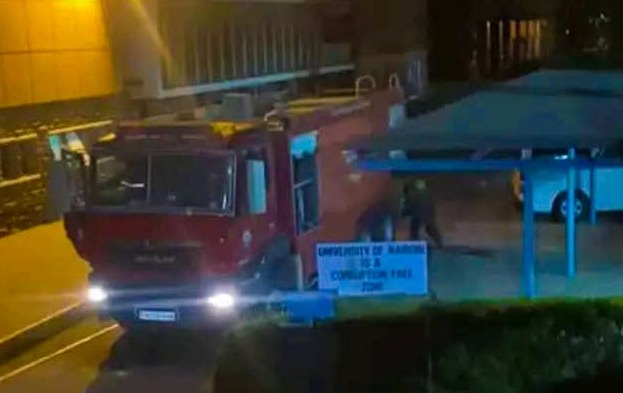The World Health Organization (WHO) said at least 413 people have been killed in Sudan and more than 3,550 wounded over the past week.
Intense battles leave staff and patients trapped in hospitals for days as doctors try to treat an influx of wounded despite depleting resources.
“I’ve never experienced anything like this,” said Alhindy Saad Mustafa, a 40-year-old Sudanese doctor who helped treat injured demonstrators during a crackdown on anti-government protests against former President Omar al-Bashir in 2019.
“I wanted to give them [the patients and wounded] all I could offer,” he said. “Many people died in front of our eyes. We couldn’t save them.”
With the healthcare system paralysed after dozens of hospitals were knocked out of service by days of unrelenting violence, doctors and international humanitarian groups have sounded the alarm over the dire humanitarian situation unfolding in Sudan.
The Central Committee of Sudanese Doctors and Sudan’s Doctors Union have estimated that 70 percent, or 39 out of 59 hospitals, in Khartoum and nearby states had to cease operations.
The WHO warned that hospitals were running out of blood, medical equipment and supplies.
Within hours of the initial fighting, about 200 staff members and 150 patients at Al-Moalem Medical City were trapped as heavy artillery rained down on the hospital, destroying large sections of the complex and forcing everyone towards the ground floor.
“It was a whirlwind,” Mustafa told Al Jazeera. “We tried to send patients home, move critical ones to safer areas of the hospital and send out ambulances to grab injured people. But before we could leave, the streets had become a warzone, and there was no way of getting out of the hospital safely.”
“Then came the bloodied soldiers with wounds to every part of their bodies,” he said, describing an influx of about 300 injured men coming through the doors.


Over the next four days, the staff kept trying to send people home and to safety as fighting around the hospital intensified. Eventually, food and bottled water ran out, and medical supplies and equipment became scarce.
“The worst thing was seeing the injured men and chronic patients struggling to survive,” Mustafa said.”They were already vulnerable, and we felt paralysed trying to help them.”
By Tuesday, talk of a ceasefire between the warring generals, the army’s Abdel Fattah al-Burhan and the RSF’s Mohamed Hamdan Dagalo, widely known as Hemedti, gave everyone hope that they might manage to escape.
Mustafa left the hospital with a colleague to head to their homes in Khartoum’s twin city of Omdurman. The two doctors were picked up by one of their friends. In the car with them were two university students who also were hoping to cross the Nile during the lull in fighting.
“But before we made it very far, the ceasefire had failed and clashes resumed. We were forced to take cover in a now empty medical facility in Burri,” said Mustafa, referring to a neighbourhood in northeastern Khartoum.
“The situation was even worse than near our hospital, [which] we’d just left,” Mustafa said. “Residential buildings and a nearby mosque were targeted, and the streets were completely unsafe to set foot on.”
The group of five spent the night taking cover from heavy artillery. As Mustafa and the rest of the group crouched in the basement, he saw something he said will remain etched into his memory forever.
“I’ll never forget that lifeless body I saw stretched across the entrance of the medical facility,” he said about an injured man. “We tried to pull him in, but the shelling was relentless, and RSF vehicles were roaming the streets.”
When another ceasefire attempt was announced on Wednesday, the group made a run for their homes in the afternoon. After twice being stopped and searched by RSF forces, they finally crossed the bridge to Omdurman.
“I thought I would never see my wife and mother again, but I’m home now,” Mustafa said.
Although he is grateful to be back, his mind has been unable to rest as the healthcare system continues to collapse and flames of violence engulf his country.
Mustafa’s colleagues who stayed behind managed to transfer their remaining patients to other facilities as the attacks and lack of medical supplies at Al-Moalem hospital eventually pushed it to join the growing list of healthcare facilities to shut down.
Like many other medical staff members across the country, Mustafa has been trying to offer his services wherever possible. He joined some doctor friends in Omdurman to reopen a medical facility, help routine patients and take in the wounded who could be transported there.
Ongoing crisis
The need is still dire.
According to Asim Abaro, a 30-year-old doctor in Omdurman, many hospitals have been forced to remain closed because their medical supplies have run out and their oxygen stations have been destroyed.
“It’s not safe for anyone to move on the streets,” Abaro told Al Jazeera. “Doctors and patients are finding it difficult to reach the few working hospitals that remain open.”
“No new supplies are reaching us either, and electricity, water and food supplies are running low,” the general practitioner said.
Abaro said doctors have been relying on telephones and social media to arrange and carry out online consultations for patients across Khartoum and neighbouring states.
According to Germain Mwehu, spokesperson of the International Committee of the Red Cross in Sudan, the healthcare crisis is linked to medical staff being unable to reach hospitals, restrictions on the movement of ambulances, and the lack of electricity and water at many hospitals.
“Khartoum remains the most affected by this dangerous security situation,” he told Al Jazeera.
Even as a 72-hour ceasefire was announced on Friday evening to enable people to celebrate the Muslim holiday of Eid al-Fitr, the fighting has continued, dealing a blow to international efforts to end more than a week of fighting.
Like Mustafa, Abaro appealed for a truce to allow medical staff to help those most in need.
“The situation is getting really difficult,” Abaro said. “If there’s no intervention soon, there’s really no telling how bad it’ll get.”









